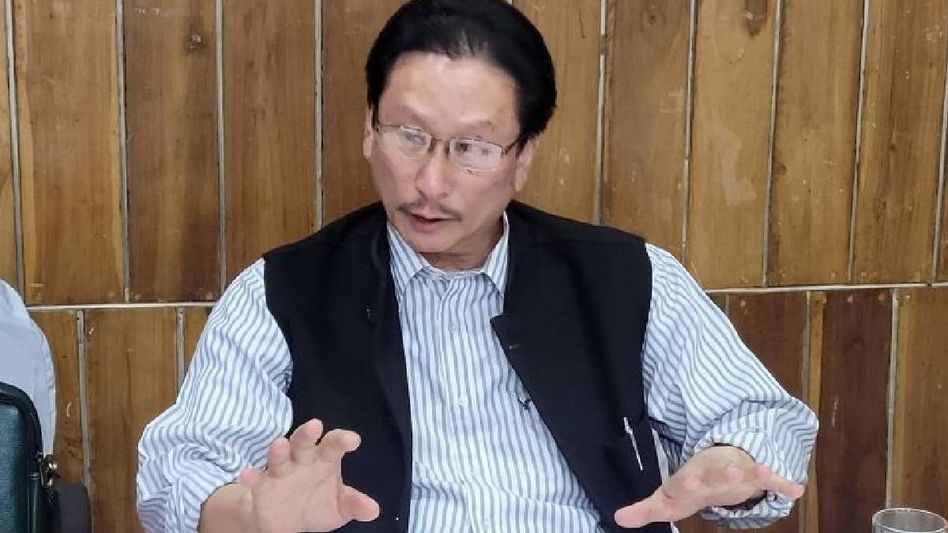Nagaland government moves forward on Frontier Nagaland Territory proposal
Power and Parliamentary Affairs Minister, KG Kenye, briefed the media on the cabinet's deliberations, emphasizing the government’s commitment to advancing the ENPO’s interests while maintaining adherence to the traditional and legal frameworks of Nagaland under Article 371A of the Constitution of India.
 Nagaland government moves forward on Frontier Nagaland Territory proposal
Nagaland government moves forward on Frontier Nagaland Territory proposalTo address the longstanding demands of the Eastern Nagaland People's Organisation (ENPO) regarding the establishment of the Frontier Nagaland Territory (FNT), the state government announced its readiness to forward the matter to the Central government. This decision was made during a cabinet meeting held on Wednesday, where various pressing issues were discussed, including the concerns raised by the ENPO and the Eastern Nagaland Legislators’ Union (ENLU).
Power and Parliamentary Affairs Minister, KG Kenye, briefed the media on the cabinet's deliberations, emphasizing the government’s commitment to advancing the ENPO’s interests while maintaining adherence to the traditional and legal frameworks of Nagaland under Article 371A of the Constitution of India. The ENLU had recently completed its internal discussions and submitted a consolidated proposal to the cabinet, which led to a thorough examination of the ENPO's requests and a consensus on a way forward.
Minister Kenye highlighted that the proposals presented by the ENPO were closely aligned with the state government's position, paving the way for a unified approach to the next steps. Environment, Forest & Climate Change and Village Guards Minister, CL John, noted that the leadership of the ENPO had undergone restructuring in July, leading to a revitalized negotiation strategy. The new leadership submitted an official proposal to the cabinet in August, marking a significant stage in their engagement with the state government.
The cabinet's discussions confirmed the ratification of the core components of the ENPO’s proposals. Minister John reassured stakeholders that the government would adhere to established guidelines while ensuring that the foundational framework remained intact. When questioned about the nomenclature of the proposed FNT, John clarified that the term "Frontier Nagaland Territorial Authority" (FNTA) was already part of the original draft, and the state government was simply referencing it in discussions.
Reiterating the government’s commitment to uphold Article 371A, which grants Nagaland special provisions and autonomy, Kenye assured that the ENPO’s objectives would be pursued without amending this crucial part of governance. He explained that the discussions aimed to reinforce the ENPO's rightful position within the current administrative structure, with any additional roles to support governance centralized within Nagaland’s framework.
Regarding resource allocation, Minister John stated that the ENPO’s proposals would follow the existing state guidelines, avoiding any separate frameworks. He acknowledged the challenges related to timely fund allocations from the central government but confirmed that resources for the ENPO region would be managed in accordance with standard procedures.
On the issue of escalating border tensions with Assam, particularly concerning encroachments into Nagaland’s protected areas, Kenye expressed serious concerns over recent developments. He highlighted discrepancies in communications from Assam's chief minister, noting misrepresentations about the disputed areas. The minister alleged that despite being well within Nagaland’s territorial boundaries, the reserve forests had been occupied, and paramilitary training camps were established in these regions.
Kenye said that the state government strongly objected to these encroachments and was prepared to engage with central authorities to resolve the issue amicably and safeguard land rights. He announced that a verification process would be initiated, led by a senior state official, to document and address the encroachments.
Also Read: Nagaland: Registration of government employees in PIMS mandatory for health coverage
Copyright©2024 Living Media India Limited. For reprint rights: Syndications Today









